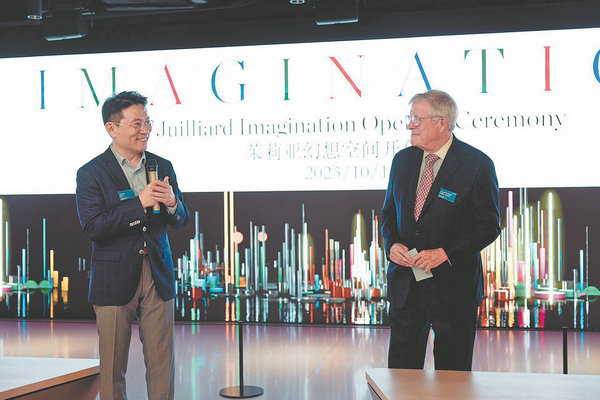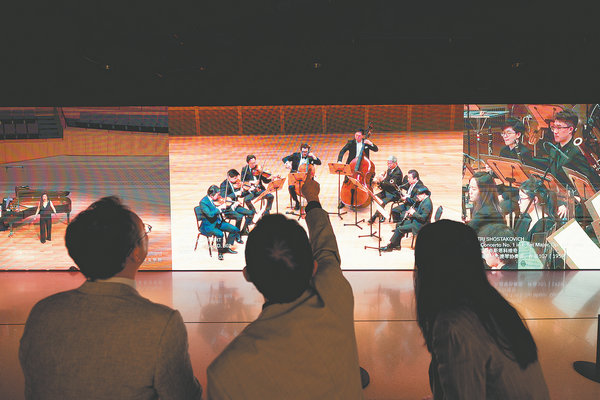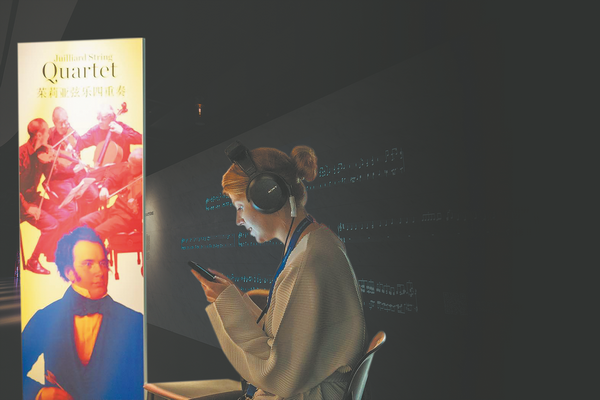Juilliard uses its imagination
By Chen Nan | China Daily | Updated: 2023-11-02 06:52
About 20 years ago, Joseph W. Polisi, then the president of the Juilliard School in New York, had a conversation with French conductor and composer Pierre Boulez (1925-2016).
They talked about Boulez's involvement in Centre Pompidou in Paris, where people can come and go and which is open to the public from early in the morning to late at night.
Boulez also created and directed the experimental Institute for Research and Coordination in Acoustics/Music, also known as IRCAM, in the 1970s, which was housed in the Pompidou. It's an institute dedicated to musical, acoustic and computer research, which is also accessible to the public via hi-tech.

"It would be a great idea to have such a space in New York and we explored some possibilities at the Lincoln Center, where the Juilliard School is located," recalls Polisi. However, that idea was never fulfilled.
On Oct 12, standing in the Tianjin Juilliard — the Juilliard School's first overseas branch, Polisi announced the opening of Juilliard Imagination. The space, which he envisioned about 20 years ago, opened to the public throughout the Tianjin-Beijing region and beyond.
"When we started building the Tianjin Juilliard, we knew that there would be a large basement area, about 1,800 square meters, that we could use for something. I once again thought about the idea of a space for the public," says Polisi, adding that by that time, digital media was "very much functioning", which supported his ideas, enabling the manifestation of the project.
As the first performing arts institution in China to offer a US-accredited Master of Music degree, the founding of the Tianjin school was announced in 2015 and construction broke ground in 2017.
Polisi served the longest presidential term in the history of the Juilliard School in New York with a tenure lasting from 1984 to 2018, and he is now the Juilliard's President Emeritus and Chief China Officer.
This September, he was given the Lifetime Honorary Award during the inaugural Orchid Awards ceremony, which took place in Beijing and recognized 10 foreign nationals.
The Orchid Awards, organized by the China International Communications Group, seeks to recognize and honor those who have made significant contributions to cultural exchange and mutual learning between China and the rest of the world.
Polisi was credited for his contribution to the establishment of the Tianjin Juilliard, providing a new platform and injecting fresh impetus into promoting music education exchange between China and the United States.
The newly opened space is named Juilliard Imagination, "because it's an environment where you can create your own stories", Polisi says.

"Juilliard Imagination is bringing together a high level of technology, using Sony hardware and software, and advice from extraordinary individuals from around the world. It's very interactive. We found that the public enjoy the experience of understanding music, from composing their own pieces to experiencing treasures from our manuscript collection. There will be a lot of activities, a lot of fun and a lot of engagement," he says.
There are five curated sections in the space.
Treasures is a trove of rare musical manuscripts and first editions comprising 141 selections from the Juilliard manuscript collection. Visitors can explore works by composers such as Bach, Brahms, and Verdi, as well as enjoying excerpts from Mozart's Don Giovanni and Purcell's Dido and Aeneas with accompanying music from Juilliard performance recordings, while following the notated music in the manuscripts.
They can view the final working manuscript of Beethoven's Ninth Symphony with extensive revisions, corrections, and alterations by the composer. They can also see the manuscript of the final scene of Mozart's The Marriage of Figaro and an extensively revised manuscript covering approximately the last 50 measures of the first movement of Mahler's Ninth Symphony.
Panorama, a 20-meter high-definition multimedia wall, presents performances of opera, chamber music, dance, and orchestra from both the New York and Tianjin campuses.
Playlist is a high-resolution music station enabled by Sony technology, representing the state-of-the-art in sound reproduction. Musical selections, covering a wide variety of composers and genres, from traditional music to contemporary, are curated by renowned educators, alumni, and artists from the Juilliard community, including conductors David Robertson and Yu Long, and composer John Williams.
For example, visitors can enjoy composer Chen Qigang's La Joie de la Souffrance (The Joy of Suffering), performed by the Shanghai Symphony Orchestra under the baton of Yu.
"I love the composer's approach to writing this piece of music. There are traditional and contemporary sounds in his work," Yu says in a recorded introduction to a recording.
Yu also has more recommendations. "Mahler's Fourth Symphony is my favorite symphony of his because there is so much joy. The first step in music-making is to have fun," he says on the recording.
"There is a fun section for both children and adults, where they can create their own music and take it home," says Polisi, while giving a tour of Juilliard Imagination.

In Signature, visitors can compose music by playing a three-octave keyboard, or use a mobile device to make visual art. These "signature" creations are then played and displayed on an interactive multimedia screen and can be taken home to share with friends and family by scanning a QR code.
The last section Polisi introduced is Soundscape, an engaging virtual-reality sound field experience. Visitors use special Sony headphones and handheld devices to explore the Juilliard School in New York's performances across the divisions of dance, drama, and music at different stations, with the special opportunity to experience Schubert's iconic piece, Death and the Maiden, performed by the Juilliard String Quartet.
"I have been involved in the plan for the Tianjin school from the very beginning. Our vision is to turn the Tianjin school into a center for performance, research, and interactive exhibitions, with communal spaces that are designed to welcome the public into the creative process and performance of music. Now, we have this space, providing a unique opportunity for the public to learn about Juilliard and engage with classical music in new ways," Polisi says.
























